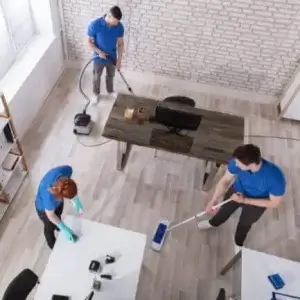Home / Compare Home And Content… / The simple guide for fir…

Key takeaways
If you’re a first-time renter in Australia and aren’t sure what to do, we’ve compiled this introductory guide. Here are a few things you should know:
- Rental payments, number of bedrooms and location are just a few factors to consider when choosing a property.
- When preparing your application, you should gather supporting documents like photo identification, proof of income and personal references.
- It’s important to organise your belongings and prepare for inspections when you move in.
Choosing the right property
 Choosing your first rental property is an important process, so it’s worth asking yourself the following questions:
Choosing your first rental property is an important process, so it’s worth asking yourself the following questions:
- How much can you afford to pay in rent? You could set yourself a limit on the amount of rent you can afford and stick to it, even if that means missing out on your dream home.
- What type of home suits you? Decide whether you’d prefer having your own place with a backyard or an apartment with shared facilities.
- How many bedrooms and bathrooms do you need? Sharing a bathroom can be a deal-breaker for some, while having a spare bedroom means you can have guests or share the costs with a housemate.
- Who do you want to rent with? Renting a place by yourself means you’ll get a lot more freedom, but it can come at a cost. If you want to cut down your rental spend, it might be best to live with a partner or in a shared house with roommates.
- Do you need somewhere to park your vehicle? If you have a car, you might want to consider rental homes that come with a car park or a secure place nearby.
- Do you want a whole yard or a low-maintenance outdoor area? If you don’t have time to do the gardening or just dislike yard work, it might be best to find a place that requires minimal work.
- Is the property near public transport? Living on a train line or near a bus stop can potentially reduce your need for a car.
- If you have pets, does the property cater for them? Make sure any property you look at is pet friendly. For example, if you need a big, fenced-off yard for your dog, there’s no point in looking at properties that don’t offer this.
- Is the property near local shops, schools and other amenities? Being able to quickly go to the shops or walk your kids to school can be an advantage.
- Do you prefer a quiet suburban street or an urban setting? Weigh up whether you’d prefer peaceful surrounds or inner-city living with everything you need at your doorstep.
- How far are you willing to commute for work? Map out your trip to work from your potential property and work out how much time the route and traffic will impact your day-to-day routine.
Once you’ve considered these questions and any other special terms you may have, heading online to search for properties that fit your criteria is a good first step. It could also be wise to contact agents who specialise in rental properties, especially in areas where you’re looking to move.
Preparing your application
Depending on where you want to live and the type of property you would like, the rental market can be fiercely competitive. If you want to secure your dream rental property, a strong application may be the difference between getting it or missing out. It may be a good idea to prepare your application before viewing properties, so you can get a jumpstart if you like the place.
Here are some tips for preparing and handling your rental application prior to your first move:
- Call the real estate agent to ask a few questions. Be friendly and personable to make a good impression on the agent and differentiate you from the other applicants.
- Present your application with photocopies of your ID. This could include your photo identification (e.g. your driver’s licence and passport) and Medicare card. They may need to see the originals, but at least you’ve saved them the trouble of taking copies. They may also request copies of your previous utility bills, so have these ready as well.
- Prepare your proof of income. You’ll more than likely need to provide proof like a payslip, end-of-year tax certificate or bank statement. They’re looking for a tenant with a stable income, so keep copies of these handy to include with your rental applications.
- Get your personal references in order. This could keep you a step ahead of the competition. For first time renters without a rental history (and therefore no previous landlord to reference), a good character reference could be your employer or a career mentor. Choose wisely, as a poor reference can sink an otherwise strong application.
- Organise a rent guarantor. A rent guarantor is someone like a parent or family representative who agrees to step in financially on behalf of a tenant if they fail to meet their rental obligations. Once a rental history of on-time payments is established, a guarantor will no longer be required for future leases.
- Be financially prepared. You’ll need to have your first month’s rent and the same amount of bond (otherwise known as security deposit) upfront and ready if your application is accepted.
- Dress to impress. First impressions can make a world of difference. You have a far better chance of securing the property you want if you present yourself well, both in appearance and demeanour.
Handling negotiation (and renegotiation)
 Sometimes there may be room to negotiate on a rental’s listed price, but it depends on how much interest there is in the property.
Sometimes there may be room to negotiate on a rental’s listed price, but it depends on how much interest there is in the property.
By researching the market in your chosen area, it should give you an idea of whether a property will be popular with other renters. If there’s strong competition, it’s unlikely you could negotiate the rent to a lower rate.
However, there are things you could negotiate other than just the weekly rent, including:
- Lease term. Lease agreement terms often vary. Some landlords want the flexibility offered by a 6-month lease, while others want the security of a 12-month lease. In some cases, landlords may want long-term tenants, and you could negotiate for a lease that’s over 12 months (e.g. 24 months). If a long-term lease suits your needs, discuss this with the agent first before offering longer terms. For longer-term leases, you may even be able to negotiate lower weekly rental payments.
- Property condition. Landlords are looking for good tenants who can make rent payments on time and keep the property in good condition. If you’re a strong candidate, you may be able to request amendments to the property condition, such as a fresh coat of paint.
- Rent renegotiation terms. While there may not be room to move on the initial rent amount, you may be able to work out rent renegotiation terms as a part of your application. However, be mindful of the rental availability in your area, as you may also be able to negotiate rent reductions down the track. For example, if you prove yourself to be a model tenant after six months, you could offer the landlord something in return, like a long-term lease extension.
- Property inclusions. Ask the property manager whether they can include extras, like yard or garden maintenance, as part of the rental agreement.
Organising your property condition report
A property condition report will list the condition of the property in general as well as various items within the property, including white goods and any furniture or furnishings. By taking the time to be thorough at the initial stages of your tenancy, it will benefit you in the long run.
- Do a thorough inspection. Any discrepancies between your observations and the property condition report (e.g. a cracked tile or a carpet stain) should be noted with the agent, so take photos of everything in every room before you move in. Otherwise, you might be held responsible for existing damages when you move out, even if they weren’t your fault.
- Make sure you receive an amended copy of the property condition report. This will be used to assess whether or not your bond is returned at the end of your tenancy.
Getting move-in ready
 Once you’ve signed a residential tenancy agreement (more commonly known as a lease) on your new home, it’s time to move in.
Once you’ve signed a residential tenancy agreement (more commonly known as a lease) on your new home, it’s time to move in.
Here are some steps to make sure you’re ready to go:
- Organise your belongings. Moving into a new property is the perfect time to take stock of your belongings and to create a home contents inventory. Remember to take care when moving your furniture and possessions into the property to avoid damaging walls and floors.
- Insure your possessions. Remember that your rental agreement doesn’t cover your belongings if they’re damaged or stolen while at your rental home. If you want to protect your possessions (like furniture, clothing, electronics and jewellery), you’ll need to take out renters insurance – also known as contents insurance. Without cover, you could face the costs of replacing them out of your own pocket.
- Prepare for inspections. As a tenant, you may be subject to periodic property inspections. The frequency of these inspections varies in each state, but inspections are usually carried out within the first six weeks of a new tenancy, then every three to six months afterwards. Make sure your place is clean and tidy all the time, but especially before an inspection.
- Confirm your notice period for inspections. Property agents are required to give tenants sufficient notice (usually seven days) about an upcoming inspection. Check with your property agent to find out how often they conduct inspections. It’s also important to check with your local tenancy advocacy and advice service for specific notice periods for entry to the premise for reasons other than inspections (e.g. urgent repairs, prospective buyer tours).
Vacating your property
Looking to move out of a rental home for the first time? Some things that may help you leave on good terms with the property owner include:
- Giving sufficient notice. Whether you’re leaving by choice or circumstances, the initiating party must give notice. The notice period varies depending on the reason for vacating a premise as well as by state and territory. Check with your local tenancy authority to find out which notice periods are applicable to you. Notice must be given in writing and include the date of notice, the date you will vacate the premise and reason for vacating.
- Preparing your property for handover. Once notice is given, you’ll need to arrange for the property to be ready by the stated date. You’ll be required to return the property to the agent/landlord in the same condition that you received it. While you may not be responsible for general wear and tear, you should leave the premises in a fairly clean condition and repair any damage you were responsible for.
- Organising end-of-lease ‘bond’ cleaning. The condition in which you leave the property will have a direct effect on the return of your rental bond. It can be worth budgeting for a professional cleaning company to do an end-of-lease clean as this can help to ensure the property manager is able to return your bond.
- Attending the end-of-lease inspection. If you can, attend the end-of-lease inspection. This is where the agent will inspect the property against the initial property condition report and any amendments made to the report throughout the tenancy. All going well, your bond should be returned without dispute. However, if there are any disputes, you can apply for these to be resolved through the Tenancy Tribunal in your state or territory.
Meet our home and contents expert, Adrian Taylor
As a General Insurance expert with over 13 years’ experience in financial services, Adrian Taylor works to make it easier for homeowners, renters and landlords to protect their home and contents. He believes it’s important for all residents (whether they rent, own or lease) to have adequate financial cover for their property and belongings in case the worse should happen.



